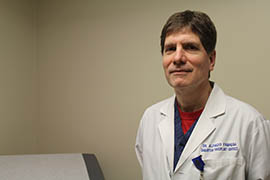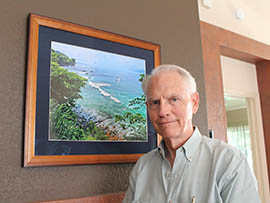Cronkite News has moved to a new home at cronkitenews.azpbs.org. Use this site to search archives from 2011 to May 2015. You can search the new site for current stories.
Record number of registered organ donors, but long waits for kidneys remain
When Mark Larson first required a kidney transplant in 1984, obtaining one was relatively simple because his sister was willing to donate one of hers.
When that kidney failed three years later, he spent five years on a waiting list – and undergoing dialysis – before receiving one from a deceased donor.
Larson said the process was grueling, including one false start when he returned from vacation only to find out that a kidney he was supposed to receive wasn’t going to work out.
“I was disappointed, and having gone through what I’ve already gone through, I just said, ‘OK, this is one more bump in the road,’” he said. “You just gotta keep a good attitude, which I always believe is a good way to live my life.”
As of April 30, 2,011 Arizonans were on the waiting list for kidneys, which are by far the organ in greatest demand, according to the Organ Procurement and Transplantation Network.
There have never been more registered organ donors in Arizona – more than 2.5 million – thanks in large to a change in 2006 allowing people to register as organ donors when receiving driver’s licenses, according to the Donor Network of Arizona. Ninety-five percent of donors registered through the Arizona Department of Transportation’s Motor Vehicle Division.
Even so, a little more than half of Arizona’s adult population is registered to donate organs, eyes and tissue.
Without a live donor willing to offer a kidney, patients usually endure years-long long waits for kidneys because obtaining organs for donation involves more than just having a large pool of potential donors.
Donors must be legally declared brain dead, must be 70 or younger and must die in a hospital. They can’t have had diseases such as cancers that affect certain organs or have HIV, tuberculosis or other infections that could be transmitted through organs.
About 1 percent of people pass away in a manner that allows them to be an organ donor, according to the Donor Network of Arizona.
In 2014, 129 Arizonans died while waiting for a lifesaving transplant, and 95 of those people were waiting for a kidney, according to the Donor Network of Arizona.
Dr. Alfredo Fabrega, medical director of Banner – University Medical Center Phoenix’s transplant program, said patients are on the waitlist for kidneys for about five years.
“There’s always a shortage,” he said.
“Patients survive longer on dialysis, and sometimes if you have heart failure or liver failure they don’t survive that long,” Fabrega added. “So you don’t have five-, 10-year waiting times for livers because you wouldn’t live that long.”
Kidney disease is the ninth-leading cause of death in the United States, and about 31 million people in the nation have chronic kidney disease, according to the American Kidney Fund.
Jacqueline Keidel, spokeswoman for the Donor Network of Arizona, said people on dialysis receive three to four treatment s a week.
“They’re alive and living, but it’s a very difficult life to live,” she said.
Leslie Brown, director of administration of the National Kidney Foundation of Arizona, said there may not be as many donors as there could be because people don’t often visit the Motor Vehicle Division offices, as an Arizona driver’s license is good until age 65. Drivers in some other states must renew after several years.
“Our licenses just happen to last so many years that you don’t really need to go in and get a new license and get asked that question for a long time,” she said.
In 2013, 68 percent of transplants in the U.S. were from deceased donors and 32 percent from living donors, according to the 2013 Organ Procurement Transplantation Network / Scientific Registry of Transplant Recipients annual data report.
Fabrega, medical director of Banner – University Medical Center Phoenix, said donations from living donors are becoming more popular, but he said most people aren’t aware of the opportunity or don’t want to donate unless it’s somebody they know.
Marcel Pincince, director of donor family and advocate services at the Donor Network of Arizona, said families heal from the decision to donate a loved one’s organs because they have a more positive story to share.
“Usually when they come to the hospital they only have a terrible story to tell: the story of the death of their loved one,” he said. “And now they have another story to tell that their loved one went on.”
Larson is able to travel again and serve as president of the Maricopa Audubon Society. Now a volunteer with the Donor Network of Arizona, he said he loves working with the organization that gave him another chance at life.
“In this life, sometimes terrible things happen … but this is a way to make something good come out of something tragic,” he said.
Larson said he keeps in touch with his donor family, and to this day his donor’s mother, Mercy Villegas, calls him “hijo,” Spanish for son.
Villegas’ son Jess Villegas Jr. was married two months before he died from a brain aneurysm, Larson said.
Six months after Larson received his kidney transplant and wrote a letter to the donor family, he said he heard from Mercy Villegas. They have kept in touch since.
“Even though she knows in her mind that she saved six peoples’ lives, I’m the only one she’s heard from, so I’m in her heart,” he said. “And she’s in my heart.”








